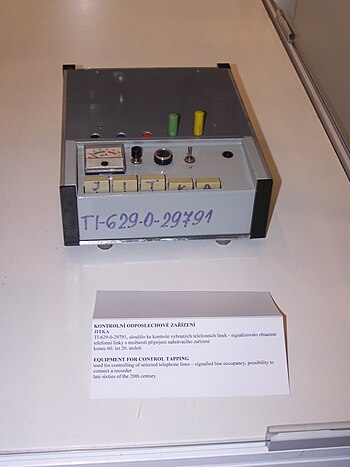
English: “Jitka” telephone tapping equipment, signalled line occupancy, possibility to connect a recorder, late sixties of 20th century, used by Czech StB (Photo credit: Wikipedia)
At the Leveson Inquiry, we heard about the dark arts practice by the tabloids and other papers. The arts describe all the ways, legal and illegal, that the tabloids used to gather information. The dark arts included hacking phones, digging through garbage, blagging accounts, and entrapping people.[1] A particular strength was paying the police and other public officials for stories.[2]
The Warnings before Leveson: What Price Privacy?
Even before Leveson, there had been warnings from the Information Commissioner’s Office (ICO) about the problem. [3] The initial warnings helped organizations to improve their systems to protect personal information. However, organizations were slow to adapt and the abuse continued. Organizations find it difficult to adapt new practices and new regulatory systems take even longer. The effort to improve data protection and privacy systems was slow and patchy. The ICO hoped that awareness would deter would be criminals and encourage organizations to improve. The deterrence failed and organizations did not take the threat seriously. Even now, people glaze over at the sound of “data protection”. In many cases, such as the police, the organizations turned to technology such as computer systems that would track access to systems. People determined to sell personal data found ways to do it. In many cases, the institutional blackmail by whispers continued and thrived. Only the sloppy, lazy, or foolish were caught, they need to remember the ways to avoid it.[4]
Operation Alice tells us a deeper story of the Dark Arts
We can see the efforts that some people have taken to avoid detection. Operation Alice gave us an insight into two methods, one high tech and the other low tech.[5]
A picture is worth a thousand words and avoids the incriminating email trail.
The first method was a mobile phone. The officer took a picture of the police log and showed the picture to someone else. They didn’t send it by computer so there would be no trace on the system. They took a picture and sent it by text. As a police officer, they would have known both methods could be tracked and traced. By sending a picture, it was harder to know what was sent. See paragraph 5.78-5.96
Letters are the old school way to avoid surveillance.
The second method was the use of letters.[6] In the day and age of online communication and instant digital communication, a letter seems rather old fashioned if no anachronistic system to elicit confidential or inside information. However, that is exactly what the press were doing.[7] They know the police can track telephone contacts and email contacts. However, it is harder to track and intercept the mail because you do not know what is inside of it and you do not know who sent it even if you open it. A letter has much less metadata than any electronic communication.
Operation Alice occurred after Leveson Inquiry, which shows that the media ethos hasn’t changed, its methods have.
[1] See the following discussions on Leveson Inquiry http://leveson.sayit.mysociety.org/search/?q=dark+arts (accessed 27 May 2015)
[2] http://leveson.sayit.mysociety.org/search/?q=dark+arts+paying+police (accessed 27 May 2015)
[3] https://ico.org.uk/media/about-the-ico/documents/1042393/what-price-privacy.pdf (accessed 27 May 2015) and https://ico.org.uk/media/about-the-ico/documents/1042392/what-price-privacy-now.pdf (accessed 27 May 2015)
[4] The officers who were caught in Operation Alice would not have been caught unless the police had taken a determined effort to catch them and deal with the disclosure of personal information.
[5]Operation Alice was the police investigation into what is commonly known as Plebgate in which Andrew Mitchell MP swore at a police officer when he failed to open the gate at 10 Downing Street so he could ride his bicycle through it. http://www.iocco-uk.info/docs/Met%20Operation%20Alice%20Closing%20Report.pdf (accessed 27 May 2015)
[6] What is noteworthy is the amount of letters sent by MPs. It is as if they know emails are unsafe and that letters cannot be hacked or intercepted.
[7] See paragraph 5.34



